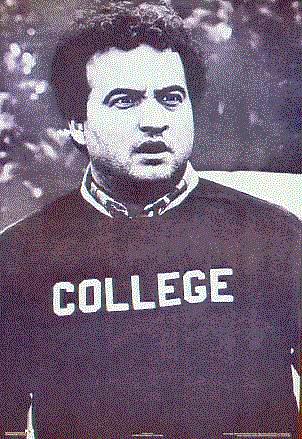Editor’s Note: This is a revised version of a letter I published before. I also published a followup addressing the question, “Is the Academic World Anti-Christian?“
Dear Freshman,
At last your time has come. Leaving behind the old world and the deep ruts you carved in the corner of that world that belonged to you, you’re off to explore undiscovered countries, to join a new and ever-replenishing society of fascinating people and learned scholars and impassioned artists and driven achievers, off to a place where the world is new and so are you. Whether or not your college years will be “the best years of your life,” they will almost certainly be among the most transformative.
The question is whether that transformation will be for the better. Unmoored from the people and places that once defined you, you’ll feel a fluidity in your identity that’s both thrilling and frightening. You may feel as though you can become anyone and anything. I pray that you will become who you are — true freedom is found in being who God made you to be — and not the person that you or your friends or even your parents think you should be. In service to that end, I thought I would offer seven pieces of advice. Though it feels churlish to say so, I offer this advice on the basis of some personal experience, with four years of undergraduate and eleven years of graduate study under my belt. I did a fair amount of teaching, came to know many professors well, and spent time too at universities overseas.
I love the university and its proper ideals. But I’m also aware of the ways in which the modern university falls short of those ideals. Here are my thoughts:
1. Seek wisdom, not merely intelligence. My father shared this advice with me before my departure for Stanford, and he was precisely right. On a university campus, intelligence is common. Wisdom is rare. Intelligence is cheap, because it’s inherited freely; wisdom is of inestimable value because it’s gained through suffering and sacrifice and years of hard study and experience. Every night at Stanford I watched the most intelligent people doing the most foolish of deeds, chasing after the most worthless of goals, and believing the most baseless of things. Their intelligence did nothing to make them more loving or joyful or genuine. In fact, in many cases it led them astray, as they came to worship their own intellectual powers along with the admiration and accolades and material consolations they could win. They became immune to criticism, self-indulgent, and chasers of intellectual fashions. When you love the reputation of intelligence, then you will do and believe those things that will sustain that reputation. Intelligence does not make you more likely to do what is right or believe what is true. This is why it’s important to…
2. Seek mentors, not merely teachers. Intelligent people are dazzling and engaging — and a dime a dozen. The fascination wears off. Colleges and universities are replete with intelligent fools, because academia’s idol is intelligence. You should seek people of wisdom. The wise are harder to find because they are far more rare and they do not advertise their wisdom. They may not even recognize it as such.
Intelligence, like physical strength, is a morally neutral capacity that can be bent in any direction, and it’s most often bent in the direction of personal advancement. Wisdom’s native movement is toward the true, the good and the beautiful. So, darken the doors of many professors, and return most often to those professors — whether or not they’re the most renowned or influential — who have true wisdom to impart. But bear in mind that those who teach you the most, your true mentors, may not be professors at all. They may be staff, coaches, campus ministers, and especially your friends. Invest deeply in these relationships. These are the people who will guide you through the many consequential decisions you’ll face in these years. It’s better to come away from college with five true friends and mentors than with fifty playmates you’ll barely recognize at the tenth reunion.
3. Seek the truth, not merely prevailing opinion. All too often, universities, especially elite research universities, reward intelligence more than wisdom and the fashionable argument over the solid one. The reasons are simple — and important to understand. Publication is the route to academic prestige. Hiring and tenure decisions at research universities (this is less true at liberal arts and Christian colleges) are overwhelmingly influenced by publications. Yet publishers are not looking for what’s true; they’re looking for what sells. If you want to publish in the most respected journals and presses, if you want to become a shining academic celebrity, then the question is not whether your contention is true — the truth is old, boring and probably viewed as oppressive by those who would rather escape from it — but whether your contention is new, provocative, and flattering to the vanities and affirming of the politics of the academic establishment. The problem is, most true things have already been explained and defended well; but in order to make your name as a scholar, you have to publish and push the envelope, which means you have to explain and defend new theses. So there’s an intrinsic bias within the academic system toward the novel and the sensational, toward that which challenges tradition. Appreciate your professors and learn what you can from them — but do not venerate them as tribunes of the truth.
I went from independent study (as an elite gymnast with a crazy training schedule, I did my schoolwork at home and went to the high school for an hour a week) to Stanford University, and I’ll confess that I stood in awe of my professors at first. They had devoted decades to studying ancient Greek literature, or psychology, or modern western philosophy. They stood atop their profession. Surely, if they said something was so, it was so — right?
Sadly, the better I came to know my professors, the less their opinions swayed me. For many I still have the utmost respect. Yet it became clear that some were constructing elaborate defenses for things they had long ago determined to believe and do. More than a few had left their faith in their youth, and had devoted their scholarly careers to justifying that decision. Many were world-renowned for their intelligence and learning; many were wonderful human beings; a few were wise. Yet academics, no less than other human beings, are swayed by their desires, their fears, their biases, and the trends sweeping the halls of academe. As someone who became one of the world’s experts in my dissertation topic, I can tell you that even when professors speak in their areas of expertise they may well be wrong — especially when one gets beyond mere facts to interpretations. And the likelihood of being wrong increases tenfold when professors, as they often do, opine on areas outside their area of expertise, and even outside their entire field. A doctorate in mathematics does not make you an expert in faith and reason.
The best professors are no smarter than the best doctors, the best lawyers, the best business executives, and so on. I say this with affection, but it’s true: many academics, especially those who have spent their entire lives at universities, have led relatively sheltered lives and can be, at times, astonishingly insecure and socially under-developed. So as anyone who values the proper ideals of academia should tell you: listen to your professors’ views, take them seriously, but never take your professors as the arbiters of what is right and true. Like the rest of us, professors are limited, biased, sometimes immature, often selfish, and completely fallible creatures.
*
I’ll publish the second part of this letter tomorrow. It includes: Seek answers, not merely questions. Seek betterment, not merely achievement. Seek fellowship, not merely friends. And seek first the kingdom of God. Please tune back in tomorrow, or subscribe via RSS, Facebook or Twitter. Also see the followup post: “Is the Academic World Anti-Christian?“













